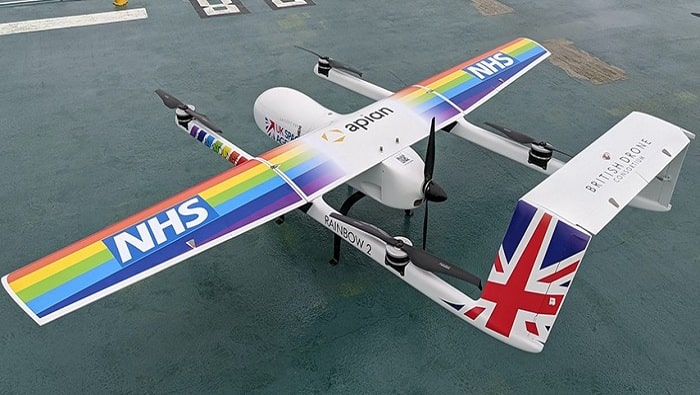A National Health Service (NHS) drone is being deployed to transport Covid-19 samples, blood tests and PPEs between Essex hospitals in England, reports theguardian.com. The trials, supported by a UKP1.3m grant from the UK Space Agency, aims to establish a network of air corridors for drones to navigate using GPS.
The project is to be based at Broomfield Hospital in Chelmsford, part of the Mid and South Essex NHS Foundation Trust, and will be supported by the local Anglia Ruskin University as the academic partner. The hospital stands on a WW1 Royal Flying Corps airfield.
The autonomous drone, will be operated by either an ex-military fast jet or helicopter instructor and initially fly between Essex’s Broomfield hospital, Basildon hospital and the Pathology First laboratory in Basildon.
The project is the idea of Apian, a healthcare drone start-up founded by Christopher Law and Hammad Jeilani. Both are trainee doctors at the Barts and The London as well as being Mid and South Essex NHS innovation fellows.
Law explains, “Covid-19 has highlighted challenges in NHS supply chain logistics. There has never been a better time to create a faster, more dependable and environmentally friendly method of transporting medical supplies.”
He continues, “We are confident that by setting up a medical drone delivery service, we’ll be able to fly samples to labs more regularly, reliably and quickly, helping improve patient health outcomes.” The aim is to reduce waiting times for couriers, free up NHS staff, reduce unnecessary physical contact, and minimise the risk of secondary transmission of the virus.
Apian is installing drone pad infrastructure, so its craft can take off from and land at hospitals, laboratories and warehouses.
Hammad Jeilani and Christopher Law with their Apian drones being trialled for Covid-19 logistics in Essex.
The drone can fly up to 300ft above the ground and withstand harsh weather conditions. The flight path from Broomfield Hospital to the Pathology First Lab is 22km and takes just under 17 minutes.The flight path from Basildon Hospital to Pathology First is 11.5km and takes just over nine minutes. This is the latest example of the drone industry assisting the world fight against Covid-19.
The company will scale the work from its drone trials by creating the UK’s NHS Air Grid (NAG), a network of secure air corridors designed to safely, rapidly and effectively enable drone delivery across the NHS. It is working closely with the Civil Aviation Authority, UK Space Agency and the emergency services to create these corridors.
UK Government adviser, Sir John Bell, a regius professor of medicine at the University of Oxford, said the trial will face significant logistical challenges.
He told BBC Radio 4’s Today programme, “The problem is, how do you get the swabs out of people’s mouths to the centres, the big labs, how do you get them out of the packaging, how do you get them into the workflow and how do you capture the data at the end?” He continued, “As always, it’s not the bit in the middle, it’s the front end and the back end that’s really the limiting factor and [that’s what] people are working on – the logistics.”
The healthcare drone company is one of three new projects using space-enabled technologies and services to support the on-going battle against Covid-19. The UK Space Agency is also backing DriverNet, a mobile app that will use satellite technology to provide access to more affordable community transport for people wishing to go to and from Covid care providers, and those looking to participate in community sport.
By using artificial intelligence to batch patients by their geolocation, their mobile phone location triangulated by satellites, and encouraging transport sharing, costs and miles could be cut by half. It is thought this could also help reduce the 15 million missed NHS appointments each year.
Also receiving funding is the delivery of a remote platform for Earth observation learning. The collaboration, led by the University of Edinburgh, builds on the Earth Blox cloud-based software for harnessing planetary-scale satellite intelligence. It will provide distance-learning support to students who would have been studying Earth observation science.
Earth observation courses involve frequently being in a laboratory and completing practical exercises, and the funding will help make this possible from home. The three projects, which will share UKP1.3 million of funding, have been selected as part of a joint initiative between the UK Space Agency and the European Space Agency (ESA).
Science minister Amanda Solloway said: “The efforts of the UK’s space sector to support our incredible NHS during the Covid-19 pandemic have been truly inspirational. The projects we are backing today are fantastic examples of how our leading space scientists are supporting those directly on the front line to help prevent the spread of coronavirus.”
In May, a drone trial was set-up to fly vital medical supplies four times a day to the Isle of Mull, in the Inner Hebrides. Meanwhile, Solent Transport, Southampton University and Windracers embarked on another trial to fly medical supplies to the Isle of Wight’s St Mary’s hospital on the island with a drone while ferry services were curtailed in April.


















